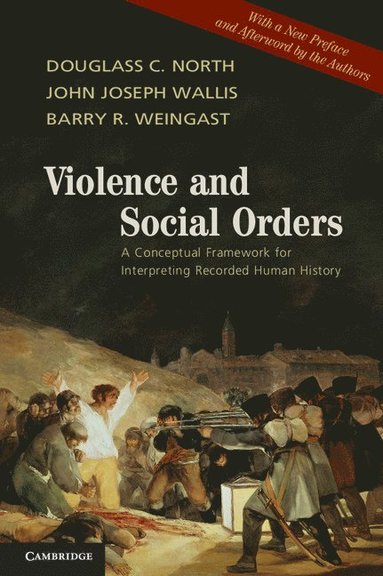
- Format
- Häftad (Paperback)
- Språk
- Engelska
- Antal sidor
- 346
- Utgivningsdatum
- 2012-12-10
- Förlag
- Cambridge University Press
- Medarbetare
- Wallis, John Joseph / Weingast, Barry R.
- Illustratör/Fotograf
- 9 tables
- Illustrationer
- 9 tables
- Dimensioner
- 226 x 152 x 23 mm
- Vikt
- Antal komponenter
- 1
- Komponenter
- WORKBOOK
- ISBN
- 9781107646995
- 499 g
Violence and Social Orders
A Conceptual Framework for Interpreting Recorded Human History
- Skickas från oss inom 7-10 vardagar.
- Fri frakt över 249 kr för privatkunder i Sverige.
Passar bra ihop
De som köpt den här boken har ofta också köpt Knife av Salman Rushdie (inbunden).
Köp båda 2 för 569 krKundrecensioner
Fler böcker av Douglass C North
-
Structure and Change in Economic History
Douglass C North
-
Economic Growth of the United States,1790-1860
Douglass C North
-
Institutions, Institutional Change and Economic Performance
Douglass C North
-
The Rise of the Western World
Douglass C North
Recensioner i media
Reviews of the hardback: 'With bravado, abandon, and great learning, North, Wallis, and Weingast have produced an excellent read - a book that is intriguing, entertaining, irritating, and provocative. Violence and Social Orders is an important book that deserves a wide readership. Its concepts will shape academic discourse and its arguments in the fields of economic history and development studies.' Robert Bates, Journal of Economic Literature
'If anyone is iconic in the economic history world Doug North certainly qualifies ... This time, North is joined by two prominent and strong-minded co-authors, John Wallis and Barry Weingast. Their collaboration has been fruitful ... Above all, the notion that one cannot simply 'get rid' of the superficial exterior of natural states and thereby uncover the beating heart of an open access order yearning to be free is the book's most important idea, and profound.' Robert Margo, EH.Net
'A demanding but rewarding work, with intriguing echoes of Marx ... Highly recommended.' Choice
'While there is still much more work to be done in understanding how to get from here to there, the authors' insights regarding the control of violence in natural, limited access societies versus modern, open-access societies are nonetheless major contributions ... North, Wallis, and Weingast's analysis of violence and its suppression provides a simple, straightforward path to understanding both authoritarianism and transitional violence.' D. Roderick Kiewiet, Journal of Economic History
'... an immodestly titled and immoderately stimulating book ...' Jonathan Rauch, The National Journal
'... strong, persuasive ... Anyone interested in development, economic history, the analysis of institutions or the idea of a generalized social science would do well to read this book ... what is new in the book is the way its authors have connected, systematized and synthesized these previously disparate ideas to produce the limited-/open-access framework with which they propose to interpret human history. Their framework proves strikingly effective at this task ... the new social science paradigm it presents is compelling and worthy of wide attention.' Mark Holden, International Affairs
'This much-anticipated, pioneering, sweeping millennial history explains how the evolution of impersonal and standardized treatment, a rule of law for elites, perpetual forms of organization, and consolidated political control of the military combined to produce the 'open access' logic of rent erosion and economic growth often observed in the modern world. Emphatically multi-causal in approach, the book will persuade all those who want to analyze the complex interactions of beliefs, institutions, and organizations that they have to deal with its arguments.' James Alt, Harvard University
'Why do we obey laws, adhere to rules, and conform to norms? Doug North, John Wallis, and Barry Weingast offer a simple, powerful, an...
Övrig information
Douglass C. North is co-recipient of the 1993 Nobel Memorial Prize in Economic Science. He is Spencer T. Olin Professor in Arts and Sciences at Washington University, St Louis and Bartlett Burnap Senior Fellow at the Hoover Institution at Stanford University. John Joseph Wallis is Professor of Economics at the University of Maryland and a research associate at the National Bureau of Economic Research. Barry R. Weingast is Ward C. Krebs Family Professor in the Department of Political Science and a Senior Fellow at the Hoover Institution at Stanford University.
Innehållsförteckning
Preface; 1. The conceptual framework; 2. The natural state; 3. The natural state applied: English land law; 4. Open access orders; 5. Explaining the transition from limited to open access orders: the doorstep conditions; 6. The transition proper; 7. A new research agenda for the social sciences; Afterword.


